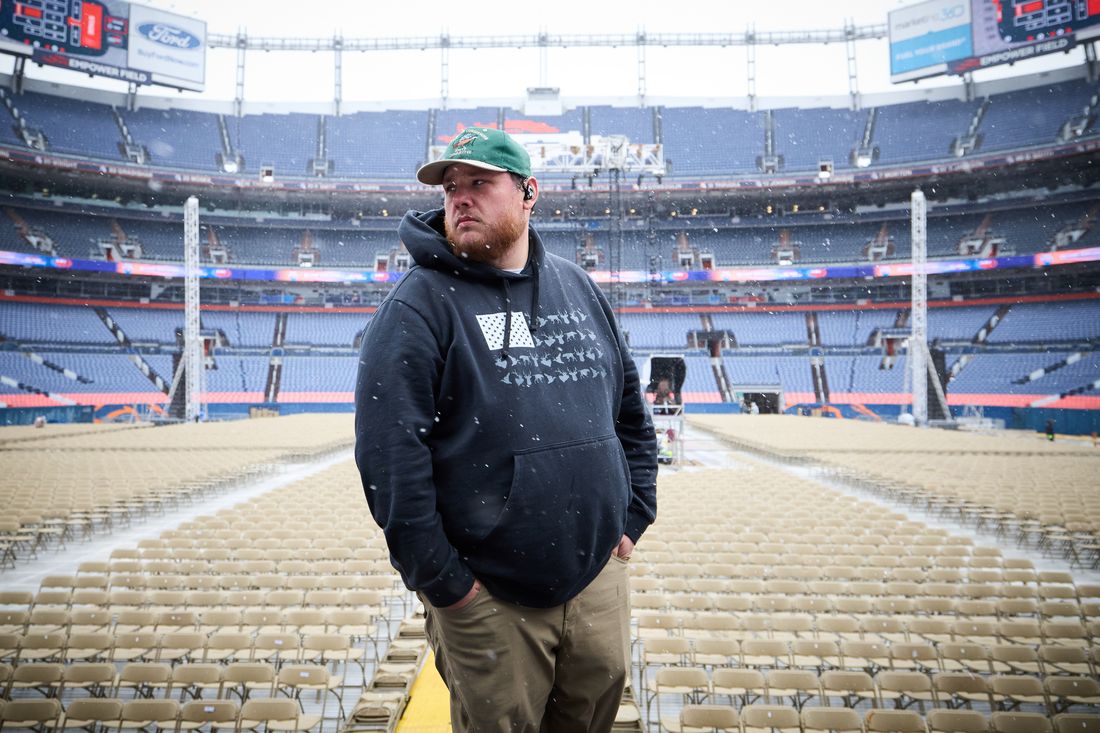
In 2014, Luke Combs had a rare but pivotal encounter: He met someone who didn’t like him.
This doesn’t happen often because, well, by and large everyone who meets Luke Combs immediately loves Luke Combs. Yet when Rob Williford, a singer-songwriter in Nashville, received a call from his high-school science teacher, Lenora Crabtree, to potentially collaborate with a wannabe country- music singer her son was roommates with at Appalachian State University, he balked.
“I’m thinking, I can’t be bothered with this. I’m a bona fide songwriter,” Williford recalls. “Basically, I felt like, Man, you’re an incredible singer, but you’re like a karaoke singer. Your songs are terrible. And I’m sure he thought I was an asshole.”
Wanting to do his former teacher a solid, though, he decided to take the meeting. Two weeks later, after bonding with the then-unknown Combs over a mutual affection for the singer-songwriter Eric Church, Williford reluctantly agreed to work with him — and quickly discovered a young man not only blessed with a stronger voice than he initially gave him credit for but a unique way with words. “And that’s when we really became best friends, like the movie Step Brothers,” says Williford, who has been a guitarist in Combs’s band and one of his closest musical confidants ever since. “I think there’s something really organic in the law of attraction that works in his favor.”
Yes. Talk to enough people around Combs — those who work with the 32-year-old singer or, really, anyone who has interacted with him in some capacity — and a clear picture emerges: namely, that of an uncharacteristically humble, down-to-earth, hardworking, fiercely loyal teddy bear of a country star. Or as one of his main collaborators, best friends, and hunting buddies, Dan Isbell, succinctly tells me, “Everybody around Luke will take a bullet for him.”
Combs is unquestionably one of the biggest acts in the country genre today, with a record-breaking 14 No. 1 singles to date, including his latest, “Doin’ This,” off his just-released third album, Growin’ Up. In fact, he has yet to release a single that hasn’t topped the Billboard Country Airplay charts. And in the five years since his agent, WME’s Aaron Tannenbaum, began booking Combs’s shows, the singer has sold out every one of them. (“Please don’t give me the credit for that one,” Tannenbaum insists with a laugh.)
“I think we all need to just step back and go, Wow, this is like a once-in-a-generation thing that’s happening,” says Combs’s longtime tour manager, Ethan Strunk. Adds Ed Warm, a top Chicago-based country-music promoter who booked the singer early in his career, “I’m not surprised at all by Luke’s rise. He delivers in the live show, he delivers hit after hit after hit for streaming and radio, and he’s a quality guy that people can root for.”
Even Combs is still shocked and humbled by his ascent. “I thought my team was crazy when they started talking about playing football stadiums, but to see them sell out just reminds me all of my success is happening because of my fans,” he says about his run of shows this summer. “It’s very humbling. I always knew I’d put in the work because I love what I do, but I still never expected anything like this, especially this fast. It honestly still doesn’t even really feel real.”
So how exactly did an anxiety-ridden Everyman from Asheville, North Carolina, elevate himself to the superstar echelon of the competitive country world? To find out, Vulture spoke with more than a dozen people in Combs’s orbit, including the man himself, to uncover the path he took to the country-music-dominating present.
Combs, as his childhood best friend, now assistant, Austin Harper, says, “had a gift” from an early age: The dude could sing. “There wasn’t a genre he couldn’t do — anything from Al Green to John Prine to T-Pain,” says Harper, adding that Combs would occasionally show off his vocal chops at parties in high school to impress girls. Not until Combs enrolled at Appalachian State, where he had the occasional bar gig playing country cover songs, did he begin taking a potential career in country music seriously. Adds Harper, “That’s when I think he finally started to see the light that he could really do this.”
After Combs dropped out of college, he quickly got to work on his career: He and Williford crammed into Combs’s rundown silver Dodge Neon, moved to Nashville, and, for nearly a year, performed small gigs together. Harper recalls talking Combs through his struggles to “make it” in the industry around this time: “We had a lot of late-night conversations about his anxiety. Luke was struggling a little bit mentally. Honestly, though, all that I cared about was him being able to pay his bills and not have to eat ramen noodles.”
Yet even then, when Combs had only a few original songs to his name and filled the rest of his set with covers, things were progressing, well, rather atypically. A dedicated fan base was steadily growing by word of mouth. “We were doing the tin-roof bar circuit and little clubs,” Williford recalls. “And the first time we go to a place, maybe 100 people show up. The second time we come back, there’s 500. And by the fifth time, it was selling out.”
“I had a pretty good inkling that what we were doing was different,” Combs notes of his emerging grassroots fan base at the time. “And not from, like, an arrogant standpoint. It was just more like an intuition.”
Things ramped up further when Chris Kappy came into the picture in May 2015. Combs’s gregarious future manager had a background booking musical performances on cruises — everybody from John Mayer to 311 to Kiss. “Most importantly, I worked with passionate fan bases,” he says. Based in Atlanta at the time, he occasionally organized club gigs to offset his day job. That eventually included a set for Combs at the 40 Watt Club in Athens, Georgia, when the future star had only six original tracks to his name. “We were expecting three people to be there: Luke, my friend, and myself,” Kappy says, “and we ended up having 83 people show up. They were just singing every word to Luke’s songs. I was like, He’s got it! I’ve been around lots of great bands that have that thing. But to see it in real time was absolutely amazing.”
Kappy dropped everything and persuaded Combs to let him come onboard as the fledgling country singer’s manager. That first year, Kappy did it all: acting as business lead, mixing audio at shows, running the merch table. “It’s funny, people now call me ‘the lottery ticket’ in town behind my back,” he says. “But there’s a whole lot that no one saw I did. I mean, Luke was living bare bones. I was living bare bones. I was like, ‘Look, I promise you this. In five years, if you fucking follow the plan and you trust me, you’ll be on a bus selling out theaters and making a million dollars a year.’ And he did it.”
What Kappy, Williford, and others specifically started seeing was who was showing up to those sets. It wasn’t the normal country crowd. “At first, it was a lot of burly guys” like Combs, says Strunk, his eventual tour manager. “And then their girlfriends started to like the music too. It was just really interesting to watch how the fan base morphed.”
Before long, Combs was regularly selling out 1,000-seat venues in the Southeast and getting his songs on local country radio. Nashville took notice.
“The very first time I ever heard the name Luke Combs was from one of our radio people,” says Randy Goodman, chairman and CEO of Sony Music Nashville, Combs’s current label. “He was telling me about how Luke was blowing up in the Southeast region, and these radio stations that are very, very difficult to get on were beginning to add his record. Some of the team went down to Georgia and saw him play live, and they came back with these reports of ‘Oh my God, this guy is incredible!’”
Of course, when Combs arrived in person at the Sony offices for the first time, he looked anything but the stereotypical leading country man. “He walked in wearing a big ol’ Merle Haggard T-shirt and had dip in,” recalls his former publicist, Mary Catherine Kinney, with a laugh. “And I was like, I’ve never seen anybody like this before. He was who he was.”
Combs knew he wasn’t what labels had typically been searching for. He had grown accustomed to being passed over. Hell, before Kappy came on, some prominent management companies in town had dismissed him as nothing more than a behind-the-scenes songwriter. “I always felt overlooked or written off before anyone had even given me a shot,” Combs says now. “It was like, ‘This guy? Take one look at him. No chance.’”
“He’s not representing the GQ guy or the person that you think is the stereotypical leading man,” Goodman says. “He’s representing the vast majority of people in this world.”
But get Combs onstage or, for that matter, in the studio, and people quickly realize they’re dealing with someone special — a relatable artist whose songwriting craft is in the vein of classic ’90s country. “You’ve got to understand, this is in the midst of pop country like Florida Georgia Line,” Jonathan Singleton, one of Combs’s key co-writers (“Beer Never Broke My Heart,” “Cold As You”) and co-producer for his two most recent albums, says of first meeting Combs around 2016. “So yeah, you really hoped Luke would take off because it was obvious that this guy was of an old-school country mentality.”
After Combs signed with Columbia Nashville (a subsidiary of Sony) in October 2016, “Hurricane,” a song he had previously released on iTunes that fast became a staple of his live show, was officially serviced to country radio. Brusque and burly with a sing-along chorus anchored by Combs’s baritone, the song quickly worked its way to the top of the charts. By May 2017, “Hurricane” had hit No. 1 and would stay there for two weeks, making Combs the first male solo artist to have a multi-week No. 1 debut single since Darius Rucker’s “Don’t Think I Don’t Think About It” in 2008.
“To hear the fans sing it back to me now always reminds me that’s the one that started it all,” reflects Combs. “That song had been with me for a while by the time it finally went to radio, so I was kind of ready to move on to something new, but I’m glad we didn’t because the fans took hold of that song and rode it all the way to the top.”
A few weeks later, in June, came the release of his debut album, This One’s for You. Featuring other chart-topping singles, including “When It Rains It Pours” and “One Number Away,” the record was an absolute behemoth: It sat at No. 1 on the Top Country Albums chart for 50 weeks, a record for a male artist.
“The rise was meteoric,” says songwriter Isbell. By November 2017, Combs had sold out two nights at Nashville’s iconic Ryman Auditorium in less than 60 seconds. By the time he released his second album, 2019’s What You See Is What You Get, which also topped the charts, he was beginning to book arenas.
Combs’s success only escalated in the years that followed. Each single he released — from bonus tracks off his first album (“Beautiful Crazy,” “She Got the Best of Me”) to the lead-up singles to What You See Is What You Get (“Beer Never Broke My Heart”) and the first single off his forthcoming new album (“Doin’ It”) — topped the country charts. His manager, Kappy, can only marvel in amazement at what Combs has accomplished. Across the 14 singles he has released to radio to date, the singer has spent 42 weeks atop the Country Airplay charts. “That’s astro-fucking-nomical!” Kappy says. “That’s unheard of. That doesn’t happen.”
“I’m often reminded, with the plaques and whatnot, but it all still feels like a dream,” Combs says. “I think to myself sometimes, Is this really happening?”
Having major success on radio wasn’t exactly what made Combs a true country-music behemoth, though. It was his live show — more specifically, his ability to play to a diversity of audiences.
“We wanted to be accepted into any genre,” says Tannenbaum. “We could have gone and just played a bunch of casinos and got as much money as we wanted.” Instead, he booked Combs at major cross-genre festivals like Bonnaroo, Lollapalooza, and Austin City Limits. “I feel as though we’ve been very thoughtful and very patient and very strategic on how we present him to the population at large, and I think we’re seeing the benefits of that now.”
According to Combs, playing to some noncountry crowds, as he did in May at the New Orleans Jazz Fest, is great for making new fans. But he says it also serves a bigger purpose: “I think country a lot of times gets a bad rap. So if I get in front of people, they might go, Man, maybe I wrote country off and I never even gave it a chance. It’s always been about the betterment of our genre.”
Now, only five years since releasing his debut, Combs is playing football stadiums. “I mean, yeah, it’s pretty fast,” he says of recently selling out Denver’s Empower Field at Mile High and Seattle’s Lumen Field. Those in the industry see it as only the beginning of what Combs can accomplish. Adds Kappy of the current task that sits before Combs, “What we challenge him to do is no longer have to connect with a room that’s 2,500 people. Now it’s 52,000 people. And he does it.”
“It’s built to last,” adds Tannenbaum, who notes that Combs is already playing arenas in Europe and Australia and is looking to expand into the Asian market by playing countries like Japan. “We think he can be as big as he wants to be. A global artist. I believe you’re gonna see him up there with names like Taylor Swift, Ed Sheeran, Coldplay.”
To that end, this past November Combs was named Entertainer of the Year at the CMA Awards, one of the industry’s highest honors. “I think Kappy fell to the ground because he was so happy,” says Sophia Sansone, a member of Combs’s management team. “It was just the most surreal moment.”
Despite all the monumental success, however, those who know Combs best say he hasn’t changed a bit from the hungry, bar-gigging singer of his earlier years.
“I would argue that he’s actually gotten more humble and he’s gotten more in touch with the things in life that you shouldn’t take for granted,” says his childhood friend Harper.
Unlike many artists, Combs hasn’t succumbed to the pressures of the industry. In fact, Sansone likes to tell a story about how lucky she now feels to work for him. Her strict Catholic family, as she tells it, was at first hesitant to let her find a job in the music industry; they’d heard horror stories. And then they met Combs. Naturally, they now strongly approve.
“Because he’s a solid motherfucker,” Williford says with a laugh.
Adds Sansone with a smile, “Now I just look at Luke and I’m like, Thank God for you!”



